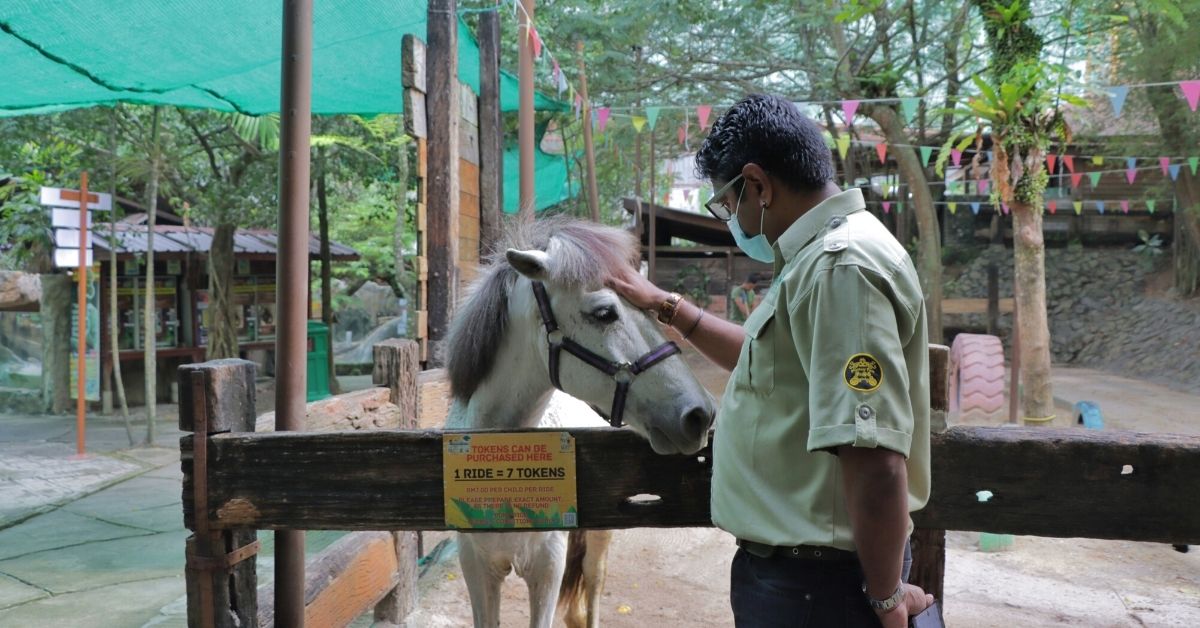Uncertain. That was the one word Raja used to describe the atmosphere of Farm In The City (FITC) during the 2 MCOs.
Being in the tourism industry, the general manager of the outdoor petting zoo was well aware of the risks that came along with the business. Bird flu, the haze, and the rainy seasons were some familiar instances that usually scared visitors away. However, the team always knew that such crises would blow over within 3 months.
He confessed, “But this particular thing (MCO), we just couldn’t say when it would end, we just couldn’t plan. We reached a level where we were sitting down wondering, ‘Are we going to close down? Is it going to end this way?’”
Dressed in his ranger uniform, the charismatic Raja met us at the park’s entrance on an early morning, ready to take us around to meet the animals. While introducing us to the farm’s Dinosaur Turtle, he told Vulcan Post the story of what it was like managing a petting zoo that couldn’t earn an income from ticket sales.

It Wasn’t Supposed To Be Like This
It was the start of a new year where 2019’s year-end school holidays had just ended. The staff at FITC didn’t have much time to catch their breath though because the next wave of visitors would be coming by—the crowd taking advantage of their New Year promotions.
Raja explained that revenue from this sale would be used to fund the farm’s operations for the rest of the year. However, they were met with cancellations in January 2020 as the virus began to spread globally.

Hit with the MCO in March, FITC was left with their cash reserves, and estimated that they only had a runway of at least 6 months.
This cash reserve, Raja added, was not only meant for the expenses in FITC, but their other parks too. They include the KL Tower Mini Zoo, Phantasy Farm in Port Dickson, and another in Bentong, which is still in the works.
Thankfully, food and medicine for the animals had already been covered when preparing for the anticipated January crowd. “It was enough to feed the animals initially, but it was still eating up into our reserves,” shared Raja.
Drastic measures to cut costs had to be taken. Not wanting to dismiss employees, they were put on rotational shifts, albeit with a heavier workload as 15 staff now had to cover for what used to be a 40-man job. This served as a two-pronged approach, as the staff were given the liberty to pick up part-time jobs elsewhere on their off shifts while maintaining business continuity if one group were to get sick.
“Even though the park couldn’t open, we still needed to clean on a daily basis to make sure no bacteria or viruses would infect the animals,” Raja shared.
Not only that, they had to find ways to stock up on the pets’ food strategically. “We couldn’t reduce the quality of the animals’ food because they just wouldn’t eat it,” the animal lover laughed, joking that the animals were picky eaters too.

With a developing park in Bentong, they realised they had unused land, which led them to plant fruits and vegetables for the animals there. That helped cover at least 30% of the costs in food procurement, with the other 70% purchased from other sources.
“Customers began calling in too, offering to send in fruits and vegetables to feed the animals, which helped tremendously with their food supply,” Raja gratefully told Vulcan Post.
As we continued walking down the park’s path, we were met with some deer, who, just like dogs, clicked their hooves up to greet us the moment we entered the pen. “Did the animals wait by their gates hoping to see customers during the lockdown?” I asked curiously while petting the friendly doe.

“It was mostly mammals like these deer and alpacas since they’ve gotten used to people grooming them. They actually waited every day at the gate for people, because they’re so used to the attention,” the manager explained.
“In terms of birds and reptiles, they were freely roaming around in their own enclosures so they weren’t affected that much since the staff were still coming in to clean and feed them on a daily basis.”
Going Above And Beyond For Customers
As the farm couldn’t sell any tickets nor ask for donations as they were a business, they pivoted to selling their souvenir store’s products via Facebook Lives and WhatsApp. One customer even called in, requesting a special delivery as a gift to his girlfriend at a specific time and day.
Touched by this customer’s intent, Raja went out of his way and pulled some strings to make it happen. He even told his staff that if they couldn’t outsource a delivery, he would personally make the trip, risking roadblocks to send that alpaca plush to this customer’s lover.
But the farm’s founder, Dato Allan Phoon whom we met in his barnhouse office, shared that the online sales couldn’t garner much in revenue. On average, it would only bring in about 3-5% of the average RM7-8K they’d make on a normal day from ticket sales. This revenue, though small, was used to purchase more animal feed.
However, their e-commerce activities are still ongoing even with visitors welcomed again after both MCOs.

Tragedy Unites Humanity
Once 2020’s CMCO came by, Raja shared that others in the tourism sector began joining hands. He received calls from agencies and hotels offering to collaborate for package deals that could benefit both businesses.
He recalled, “We all started coming together calling each other like, ‘Hey, what can we do? We’re also dying here, how can we help?’”
This, he told Vulcan Post, wasn’t the same as the down periods experienced during the haze, because being indoor businesses, hotels and malls wouldn’t feel similar adverse effects, for example.
Conversely, if the economy wasn’t doing well, people strayed from malls to save money, but still visited FITC as it was affordable.
“So, we used to only look after ourselves, but now everyone isn’t doing so great, even malls. They asked us, ‘Would you like to bring some animals to the mall? Maybe you can set up a booth here to sell some tickets?” he elaborated. “Everyone was actually talking to each other about how we could overcome this together.”
Moreover, FITC was getting calls from visitors and volunteers alike, excited to show their support and play with the pets again. To manage crowds, they would allow up to 900 pax for every 2-hour slot, where visitors would follow a one-way path to mitigate clashes.
The workforce has also risen back up to 40 staff per day, where at least 3 workers are required in an enclosure to manage crowds and keep an eye on visitors’ interactions with their 280 species of animals in the park.
With international tourism still down, visitors consist of a large number of Malaysians. Allan told Vulcan Post that before this, most locals weren’t even aware that such an attraction existed in the country.
To him, FITC has an important role to play, and not just in educating children and their young parents on how to respect, care for and interact with animals.
Having grown up in a kampung close to nature, he wanted to bring those experiences to city folk too. Whenever he sees grandparents sharing stories of their own kampung experiences about animals with their grandkids while touring FITC, his heart warms.

That was Allan’s main goal: to set up a location where family memories could be made, where they could be savoured again on an annual basis when the pictures posted on Facebook pop up as reminders.
Snaking through the school holiday crowds on an early Thursday morning, Raja walked us back to our car. The sights we saw were hopeful, with busy queues at the ticketing counter and children excitedly trying to grab buckets of seeds and veggies to feed the pets. It looked like the place was healing.
We properly exited the place and were immediately met with high-rise buildings and cars zooming around us, the memories of a fine, animal-filled morning lingering in our minds. It truly was a Farm In The City.
- You can learn more about Farm In The City here.
- You can read about other Malaysian startups we covered here.
All Image Credits: Vulcan Post

















